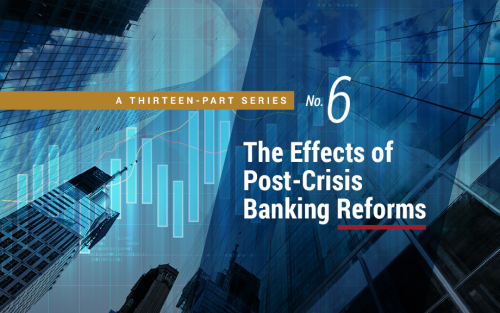Deciphering Americans’ Views on Cryptocurrencies

Having witnessed the dramatic rise and fall in the value of cryptocurrencies over the past year, we wanted to learn more about what motivates people to participate in this market. To find out, we included a special set of questions in the May 2018 Survey of Consumer Expectations, a project of the New York Fed’s Center for Microeconomic Data. This blog post summarizes the results of that survey, shedding light on U.S. consumers’ depth of participation in cryptocurrencies and their motives for entering this new market.
Global Trends in Interest Rates

Long-term government bond yields are at their lowest levels of the past 150 years in advanced economies. In this blog post, we argue that this low-interest-rate environment reflects secular global forces that have lowered real interest rates by about two percentage points over the past forty years. The magnitude of this decline has been nearly the same in all advanced economies, since their real interest rates have converged over this period. The key factors behind this development are an increase in demand for safety and liquidity among investors and a slowdown in global economic growth.
Could Rising Household Debt Undercut China’s Economy?
Although there has been a notable deceleration in the pace of credit growth recently, the run-up in debt in China has been eye-popping, accounting for more than 60 percent of all new credit created globally over the past ten years. Rising nonfinancial sector debt was driven initially by an increase in corporate borrowing, which surged in 2009 in response to the global financial crisis. The most recent leg of China’s credit boom has been due to an important shift toward household lending. To better understand the rise in household debt in China and its implications for financial stability and China’s economic performance, it is important to examine the expansion in household credit, how the rise in debt compares to international experience, and the associated risks.
Just Released: A Closer Look at Recent Tightening in Consumer Credit
Just Released: A Look at Borrowing, Repayment, and Bankruptcy Rates by Age

Household debt balances increased in the third quarter of 2018, a 17th consecutive increase. Total debt balances reached $13.51 trillion, a level more than 20 percent above the trough reached in 2013, according to the latest Quarterly Report on Household Debt and Credit from the New York Fed’s Center for Microeconomic Data. With today’s report we begin publishing a new set of charts that depict debt and repayment outcomes by the age of the borrower. The report and this analysis are based on the New York Fed Consumer Credit Panel (CCP), a 5 percent sample of anonymized Equifax credit reports. Here we’ll highlight three of the new charts.
Analyzing the Effects of CFPB Oversight

The Consumer Financial Protection Bureau (CFPB), created in 2011, is a key element of post-crisis U.S. financial regulation, as well as the subject of intense debate. While some have praised the agency, citing the benefits of consumer financial protection, others argue that its activities involve high compliance costs, increase uncertainty and legal risk, and ultimately reduce the availability of financial services for consumers. We contribute to this debate by investigating empirically whether the CFPB’s supervisory and enforcement activities have significantly affected the supply of mortgage credit, or had other effects on bank risk-taking and profitability
Do Expansions in Health Insurance Affect Student Loan Outcomes?

The Patient Protection and Affordable Care Act (ACA) is arguably the biggest policy intervention in health insurance in the United States since the passage of Medicaid and Medicare in 1965. The Act was signed into law in March 2010, and by 2016 approximately 20 to 24 million additional Americans were covered with health insurance. Such an extension of insurance coverage could affect not only medical bills, but also educational, employment, and broader financial outcomes. In this post, we take an initial look at the relationship between the ACA and higher education financing choices and outcomes. We find evidence that expansions in healthcare coverage may influence both the prevalence of student loans and loan repayment behavior. The evidence suggests that individuals covered by ACA-related expansions are taking out slightly more loans and taking a longer time to start repayment.
Landing a Jumbo Is Getting Easier

Andreas Fuster, James Vickery, and Akhtar Shah The United States relies heavily on securitization for funding residential mortgages. But for institutional reasons, large mortgages, or “jumbos,” are more difficult to securitize, and are instead usually held as whole loans by banks. How does this structure affect the pricing and availability of jumbo mortgages? In this […]
Just Released: Great Recession’s Impact Lingers in Hardest‑Hit Regions

The New York Fed’s Center for Microeconomic Data today released our Quarterly Report on Household Debt and Credit for the fourth quarter of 2017. Along with this report, we have posted an update of state-level data on balances and delinquencies for 2017. Overall aggregate debt balances increased again, with growth in all types of balances except for home equity lines of credit. In our post on the first quarter of 2017 we reported that overall balances had surpassed their peak set in the third quarter of 2008—the result of a slow but steady climb from several years of sharp deleveraging during the Great Recession.
Does More “Skin in the Game” Mitigate Bank Risk‑Taking?

It is widely said that a lack of “skin in the game” would distort lenders’ incentives and cause a moral hazard problem, that is, excessive risk-taking. If so, does more skin in the game—in the form of extended liability—reduce bankers’ risk-taking? In order to examine this question, we investigate historical data prior to the Great Depression, when bank owners’ liability for losses in the event of bank failure differed by state and primary regulator. This post describes our preliminary findings.












 RSS Feed
RSS Feed Follow Liberty Street Economics
Follow Liberty Street Economics